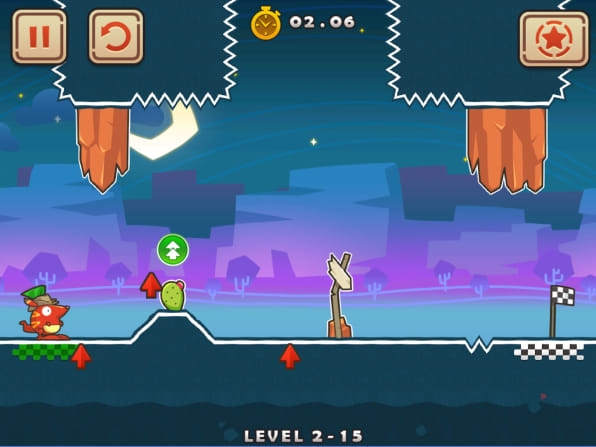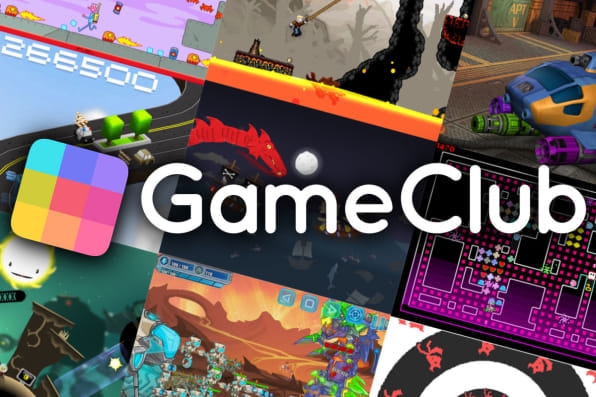Apple Arcade won’t be the only iPhone game subscription service launching this fall.
GameClub, a startup with $2.5 million in seed funding, plans to launch its own subscription service around the same time. But instead of funding new games, like Apple is doing, GameClub is bundling up old games from the dawn of the App Store, many of which have become unplayable on newer iPhones and iPads. GameClub is also working on an Android version of its service, which presumably won’t face competition from Apple.
The goal, CEO Dan Sherman says, is to bring back the kinds of mobile games that have become less viable in a market dominated by ads and in-app purchases.
“We’re just about focusing on classic premium gameplay experiences that are not compromised by the pay model,” Sherman says.
A simpler time
Like Apple, GameClub hasn’t announced how much its subscription gaming service will cost, and Sherman says the startup is still testing different prices to see what sticks. Still, he’s fairly certain that GameClub won’t sell individual games. Instead, users will download each game, then sign into a GameClub account that allows access to the full catalog.

[Photo: courtesy of Game Club]
“The way I look at subscriptions–the way I have been looking at it since I started the company–is that this is the next emerging trend in games,” he says. “I regard it as something that has the potential to be every bit as large as in-app purchases, or the ad market.”
As for which games GameClub will offer, the startup currently has the rights to 57 games and has already updated 18 of them, some of which you can try in a free open beta. Highlights include the one-button platformer Roo Roo Run, the word-building game Wooords, and the slot racer Cubed Rally World. Over time, the plan is to add even more games. And in March, GameClub hired Eli Hodapp, the former editor in chief of mobile gaming site TouchArcade, to help build out the catalog as vice president of business development. (“He’s like this encyclopedia of premium mobile games,” Sherman says.)
Compared to what Apple has teased for Apple Arcade, GameClub’s offerings are decidedly more basic. There’s no talk of redefining games with groundbreaking ideas and boundary-pushing stories, and some of the classics in the early GameClub catalog haven’t aged well.
Still, it’s easy to see the appeal of simple iPhone games that don’t interrupt you with ads or ask you to pay for faster progression, and that have defined endpoints instead of endless engagement traps. While these kinds of mobile games do still exist, convincing people to gamble on any particular one is a challenge, especially when the App Store offers a near-infinite supply of free alternatives. The subscription model allows people to try lots of games with less risk.
Reviving the classics
There’s not much risk for the games’ original developers either, because GameClub handles all the work. Many of the games that GameClub is reviving were built on obsolete tools such as Adobe Air, or weren’t designed for newer hardware such as Retina Displays and 64-bit processors. Sherman says much of GameClub’s work has involved finding easier ways to update games in bulk, and in that sense, it’s more of a developer than a publisher.
“It may take upwards of a month, or sometimes longer, for us to develop scalable tools and technology around supporting a specific engine, but once we do, it’s much easier for us to work with more games,” Sherman says.
Like any studio that brings old games back from the dead, GameClub also spends a lot of time tracking down and and negotiating with rightsholders. They’re not always easy to find, especially if the developer no longer exists. In one case, Sherman says, GameClub is figuring out how to revive a game whose studio went into bankruptcy.

[Image: courtesy of Game Club]
“Sometimes you’ve got to knock on somebody’s door in Japan, or some other part of the world. Often times it’s people who’ve left the industry,” Sherman says. “It’s tricky, but it’s a worthy cause.”
One game stands out as particularly troublesome. Flight Control was one of the first hit games for the iPhone, and GameClub’s early testers ask about it often, but Sherman says acquiring the rights is complicated because the original developer, Firemint, was bought by Electronic Arts in 2011.
“I’ve reached out to friends at EA about it, but there’s no easy process for that sort of thing and understandably it’s not their top priority,” Sherman says, “but we’ll keep trying.”
Beyond the old stuff
Eventually, GameClub wants to be more than just a repository for old games. The startup also wants to develop its own exclusives, but in the same style as the games it’s bringing back.
“We’re trying to create a renaissance of new premium game development in the vein of those classic experiences that were not interrupted by ads or in-app purchases,” Sherman says.
For that to happen, though, GameClub needs funding and an audience. While the startup raised a seed round of $2.5 million last fall, and Sherman says it’ll look to raise a smaller amount to help with this fall’s launch, the plan beyond that isn’t as clear. Sherman demurs on whether GameClub would try to stay independent or seek an acquisition, but my guess is that it will seek more funding if it can prove that its roster of old iPhone games can hold its own against the likes of Apple Arcade.

To that end, Sherman argues that there’s room for more than one game subscription service on mobile devices. In addition to Apple Arcade and GameClub, which depend on game downloads, streaming game services such as Google Stadia will let users play high-end PC and console games on phones and tablets. There’s also nothing stopping other companies large or small from bundling up premium games into a subscription, as Microsoft is doing on Xbox consoles with its Game Pass service.
For GameClub, classic mobile games are just a foot in the door, and Sherman is confident that they’ll be able to stand up to even the likes of Apple.
“If you look, for instance, at TV, the most popular shows on Netflix–or the most watched shows–are often these older classics,” Sherman says. “There’s demand for that.”
(78)